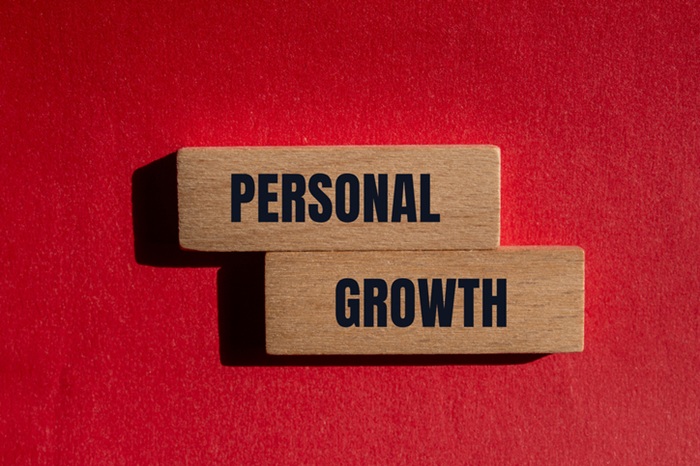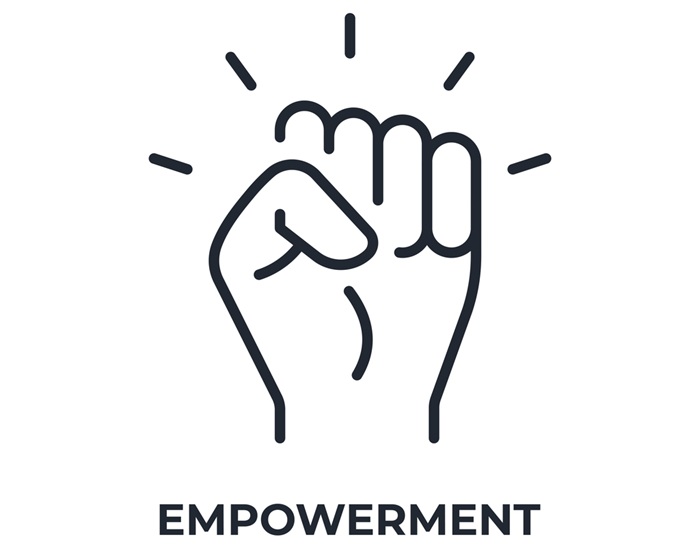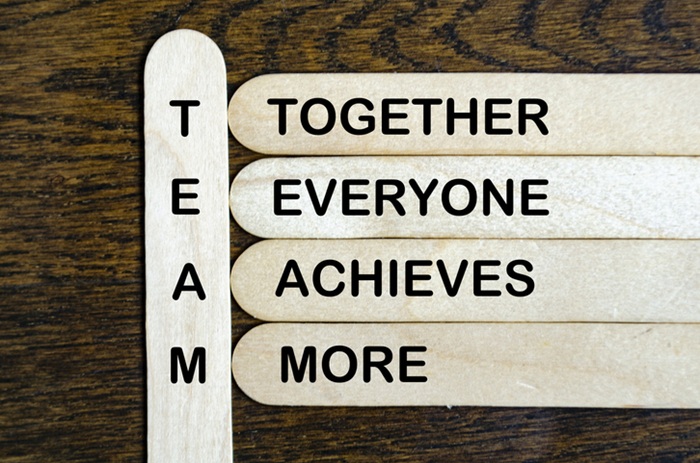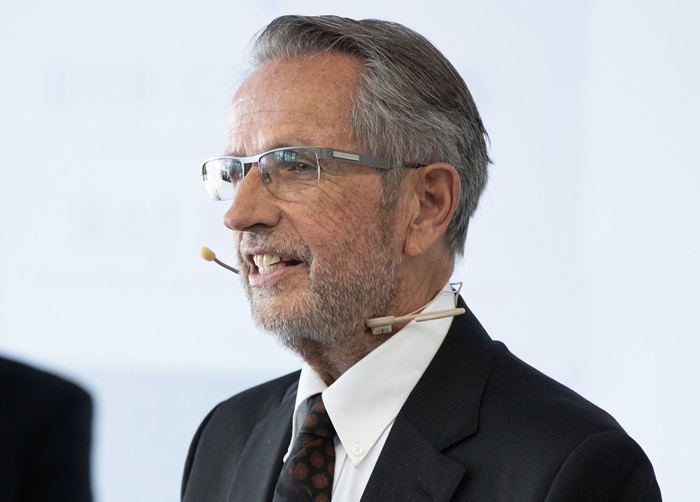Why Empowering Others in Business Has Never Been More Important
By Chris Benguhe, RaeAnne Marsh and Elaine Pofeldt | April 10, 2025 11:33 am
We spotlight seven CEOs who do it more than most!

For those who are blessed to be business leaders, it’s a watershed moment to stand up and demonstrate your thoughtful, courageous and long-term strategy for building your business by building up and protecting your people. This is your moment to shine. (iStock photo: LoveTheWind)
Amidst the current economic turmoil, uplifting and strengthening people should be the number one goal of business leaders — plus it’s an integral element of capitalism and business done right anyway.
Everyone across the board has been shell-shocked by the economic fallout of the recent and ongoing tariff war, regardless of your politics, your socioeconomic status, or whether you agree or disagree with the strategy. However, for a huge majority of Americans, that could mean a painful tightening of their belt, working more hours or even needing to find a second or third job.
For those who are blessed to be business leaders, it’s a watershed moment to stand up and demonstrate your thoughtful, courageous and long-term strategy for building your business by building up and protecting your people. This is your moment to shine.
But with dire warnings proliferating that these tariffs could accelerate inflation, making everyday goods more expensive, cause even more stock market volatility and serious supply chain challenges — all leading to undeniable economic and logistical disruptions — the temptation for business leaders will be to pass these difficulties along to the customer and the employee.
We at the Center for Social Capital implore business leaders to do the opposite, to resist the temptation to cut and run. If at all possible, you should and must weather the storm with the long-term prosperity of those stakeholders first and foremost in your minds and your business plans. If you do, you will be the victor for all the right reasons.
That makes our feature focus this month even more important to draw attention to as well as the Social Capital movement in general. Policies of empowerment in business operations flex the tremendous power and potential of capitalism to make your business prosper by improving the lives of your employees and customers, and that goes double when times are tough.
At its heart, that is the saving grace of capitalism, which will be what saves our nation and our world and may be the saving grace for many to get us through this hopefully temporary time of uncertainty and transition.
So, let’s take a look at some incredible leaders who are fighting the good fight. These C-suite stars are making it their goal to help employees not just do their jobs more effectively but live better and more complete lives.
Beyond this, many are helping customers to improve their lives and sense of self-worth and satisfaction well after the exchange of goods and services has ended. And they are bolstering their neighborhoods and communities in which they operate — or interact directly and indirectly — through the operations of the businesses and business models.
The six companies and their leaders honored this month showcase that power through their passion to improve and empower all those they interact with. So, as we all work to persevere and prosper to achieve happiness and prosperity — for ourselves, our families and friends, our nation and our world — these heroic leaders are creating a path forward through these challenges. And we hope they will also inspire others to follow suit.
Ultimately, we are blessed to live in a nation founded on ideals to empower others, to strengthen others, and to support and validate the value of humanity. There is no better time to highlight and applaud these companies and inspire others to follow suit. We ask our readers to take a good look at them and build on their examples as they continue to embrace the values of the Social Capital movement in their own ways.
Ed Bastian, CEO at Delta Air Lines
At Delta, the best ideas often come from our people. Over our 100-year history, we have built a culture that not only enables but encourages our employees to speak up about things that matter to them. Whether it’s doing the right thing for the customer in the moment, requesting a change to a process to improve safety or supporting a colleague in need, we find that empowering our employees to speak up means we can make the best business decisions and better serve our customers and our people.
Beyond this, empowering our employees also means providing the resources, opportunities and support they need to be successful not only in their careers but in their own lives. This is why, at Delta, we offer industry-leading benefits that focus on enhancing the total well-being of our people — which includes providing resources that support physical, social, emotional and financial wellness. Supporting our people in this way allows them to show up and do their best for our customers, communities and one another.

“One of the reasons our motto is ‘Keep Climbing’ — because our continued commitment to better serve our customers and our people is never finished.” —Ed Bastian (iStock image: Emre Akkoyun)
At Delta, we are constantly seeking employee feedback in many ways. It is one of the reasons our motto is “Keep Climbing” — because our continued commitment to better serve our customers and our people is never finished. One of my favorite employee experiences is VELVET, an event that connects our frontline people from all over the world with their colleagues and leaders. During VELVET, our most senior leaders, including myself, have the opportunity to hear direct feedback from our teams.
We also ask for employees to share their feedback through our annual Employee Engagement Survey. The results of this survey drive us to make improvements to the benefits we offer, technological investments we make and ways we support our team members’ growth. Another way we seek feedback from employees is our Flourishing Index. This wellness-focused survey — developed by researchers at Harvard University — measures the emotional, social, physical and financial well-being of our employees so we can recalibrate our benefits to best meet the needs of our people. Our holistic wellness strategy is grounded in the belief that if we take care of our employees, they will, in turn, take care of our customers and communities.
Listening to our people and giving them what they need is an important part of the Delta culture. We continuously create an environment where our people are empowered to share feedback because they know we are not only listening but are also taking action.
Tom Nolan, CEO at Kendra Scott
Empowering employees means fostering a culture of accountability, trust and entrepreneurship at every level of the business. At Kendra Scott, we believe that when people feel ownership over their work, they’re more engaged, innovative and committed to delivering exceptional experiences. This philosophy starts with me and extends to our entire leadership team — we set the vision and provide the resources, but we trust our teams to take initiative and make decisions that drive the business forward. Whether in our retail stores or at headquarters, we encourage employees to take smart risks, learn from challenges and continuously grow in their roles.
At Kendra Scott, fostering open communication and ensuring every team member’s voice is heard is fundamental to our culture. We empower our store managers to act as “CEOs of their locations,” granting them the autonomy to tailor experiences that resonate with their local communities. This approach not only encourages ownership but also ensures that insights from various levels of the organization inform our strategies.
We believe that feedback is most valuable when it leads to real action, which is why we prioritize listening and responding to employee concerns and feedback in a meaningful way. Whether it’s through regular check-ins or direct access to leadership, we create open channels for honest dialogue and operate as if we’re a small company. Our commitment to this extends beyond just hearing feedback — we implement changes based on what our teams require to succeed and cater to each employee’s needs.
Keith Wakeman, CEO at SuperBetter
Everyone has heroic potential. Empowering employees unlocks their powers as individuals and teams. It means collaborating with employees to develop their strengths, foster a supportive culture, promote resilience and well-being, and reduce obstacles that inhibit success. Empowerment provides needed resources, environments, skills and clarity. It connects to intrinsic motivations for autonomy, mastery, purpose and social cohesion to promote job satisfaction and work quality.
The No. 1 urgent need in employee empowerment today is cognitive resilience. Mainstream adoption of technology over the past dozen years has dramatically changed the world in which our employees and their families live. Today, the human mind is under attack. The current rapid growth of AI technologies will accelerate the frequency and intensity of these attacks. When employee resilience is low, it negatively impacts the organization as a whole and key functions that include learning and development, employee well-being and cybersecurity. It lowers employee productivity, agility, adaptability and creative problem solving. It increases stress, burnout, difficulty sleeping, anxiety, depression and other mental health struggles. In cybersecurity, up to 88% of breaches are already caused by human error, and low cognitive resilience further increases risks of human vulnerabilities.
Building cognitive resilience starts with empowering employees with an understanding of how their brains work and how technology is weaponized to activate regions of their brains in ways that are at odds with their beliefs, values, goals, well-being and mental health. Then it goes a step further to teach and reinforce a sustainable resilience mindset. The good news is that resilience mindsets can be taught. SuperBetter is an example of an easy-to-teach resilience mindset. It’s backed by five published clinical and randomized controlled trials by Harvard, Penn and others showing its benefits for significantly reducing anxiety and depression and improving resilience and self-efficacy.
Ensuring everyone’s voice is heard in a real and practical way requires fostering a safe and supportive culture and providing simple, clear pathways to request and share feedback. The culture must permeate the organization and be reinforced with leaders’ everyday language and actions. Perceived social risk, or fear of negative consequences to one’s career, will cause employees to hold back from sharing their concerns. Some employees may lack skills and will benefit from training and modeling to build their confidence to voice feedback. Adopting a shared language and beliefs across the organization can be a successful strategy to foster a safe and supportive culture that promotes resilience, thriving and open communication.

Empowerment “means practicing the golden rule: treating others as we wish to be treated.” —Amy Lemire (iStock image: Anastasia Malachi)
Amy Lemire, founder of AIM Training and Consulting Inc.
Empowering employees, to me, encompasses a positive workplace culture where respect, open communication and mutual growth are foundations for the organization. It means practicing the golden rule: treating others as we wish to be treated. By creating an environment where feedback is both encouraged and constructive, I aim to create a space where honest conversations can occur.
This is not just about receiving feedback but giving it constructively in a way that inspires and motivates. Leading by example, I am always mindful of the shadow my communication, words and actions cast. Acknowledging that someone is always listening and observing, my goal is to set a positive precedent. Transparency in leadership fosters trust, and with trust, empowerment is created naturally.
Ensuring that every voice is heard requires creating a safe, inclusive culture where individuals feel comfortable expressing their feelings and challenges as well as ideas for improvement. I believe most communication breakdowns occur not because of too much communication but rather a lack of it. By implementing ongoing cadence meetings with direct reports, we drive a culture of open communication where insights and concerns can be shared regularly. These meetings are designed to be inclusive and ensure no voice goes unheard.
Additionally, instilling a practice of reflective listening helps us understand and address concerns effectively, further demonstrating our commitment to valuing every individual’s input as a crucial component of our collective success.
Vince Barsolo, CEO at Televerde
At Televerde, empowerment starts with respect — owed respect for the humanity and potential of each person, and earned respect through the trust and accountability we build together. It’s not about ping pong tables or free lunches; those things are nice, but they don’t change lives. What changes lives is going deep — creating a culture that genuinely values every individual’s contributions and provides them with what they’ve often never had before: meaningful opportunities, clear guidance and a sense of purpose.
Because of our unique model, many of the women we work with have gone their entire lives — and particularly their time in prison — without feeling respected. When we create an environment where they are heard, supported, and trusted, it’s transformative. True empowerment means showing people that they matter, that their voice counts and that their work has real impact — every single day.
It’s not enough to ask for feedback — we have to show we’re serious about acting on it. At Televerde, that means creating multiple channels for open communication, like town halls, one-on-one check-ins and anonymous feedback tools. But beyond that, it means following through. If someone raises a concern, we address it. If someone has an idea, we consider it. When people see their input leads to real change, it strengthens trust and engagement.
For many of the women in our program, this is the first time they’ve had a platform to express themselves and be taken seriously. In the prison environment, their voices have often been disregarded or dismissed. We show them respect isn’t just a buzzword — it’s a commitment that starts at the top and flows through every level of our company. By acknowledging their ideas and acting on them, we make respect a multidirectional force that drives empowerment and, ultimately, changes lives.

“If someone shares a concern and nothing changes, trust erodes. So, we take every piece of feedback seriously.” —Jeff Abella (iStock photo: Jerome Maurice)
Jeff Abella, CEO & Co-Founder at Moka Origins, and Ishan Tigunait, Co-Founder at Moka Origins
To us, empowering employees means creating an environment where people feel valued, supported and encouraged to do their best work and grow beyond it. Especially in today’s world, where uncertainty is a real challenge, empowerment has to go beyond motivation.
At Moka Origins, we’ve established a code of ethics and a culture centered around open communication and active listening. This enables our leadership team to stay closely connected to the needs of each team member and provide meaningful, personalized support. We offer flexibility in schedules; invest in professional development through training, online courses, and internal workshops; and foster an environment that prioritizes personal well-being.
Well-being at Moka includes fair compensation, generous time off, weekly leadership programs, meal support, community development initiatives and an open-door policy.
Acknowledging our team’s achievements and contributions inspires even more growth. One of our favorite initiatives is our staff travel program, where we invite a team member each year to join our procurement team on origin trips to meet the farming partners who supply our coffee and cacao. This not only honors their role but deepens their understanding of our mission and their impact.
We also practice transparency with company goals and strategy, so every team member sees how their work contributes to the bigger picture. We give employees ownership over their roles and encourage creative problem-solving rather than top-down directives.
Making sure that, at every level of the company, everyone’s voice and concerns are heard in a real and practical way starts with creating a culture of psychological safety. We talk about this openly and act on it, ensuring every team member knows it’s okay to speak up even when it’s uncomfortable. As CEO I personally hold space for daily communication through a one-on-one standup (which I call a “speed check”) and formal team check-ins, and we welcome anonymous feedback.
The most important part is follow-through. If someone shares a concern and nothing changes, trust erodes. So, we take every piece of feedback seriously, whether it’s about products, ethics, processes, workloads or leadership, and we respond thoughtfully.
That’s how we build trust, create accountability and actively shape a culture where every voice matters.




